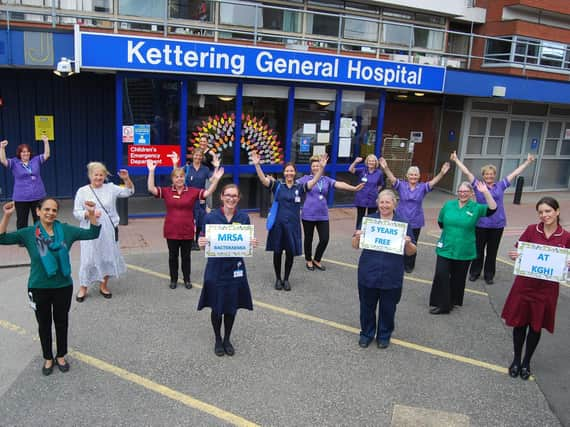KGH celebrates five years of being MRSA free


Staff at KGH are celebrating after the hospital hit a major super bug infection prevention and control achievement in the midst of the Covid-19 pandemic.
It's now been more than five years since a patient at the Rothwell Road hospital had the most serious kind of MRSA infection that affects the bloodstream - known as bacteraemia - in May 2015.
Advertisement
Hide AdAdvertisement
Hide AdMRSA lives harmlessly on the skin of around one in 30 people, usually in the nose, armpits, groin or buttocks. But when it gets into the blood it can lead to septicaemia, a life-threatening illness caused by the bacteria in the blood stream. This is the kind of MRSA infection that is the most serious form.
Five years without a case of MRSA bacteraemia is a significant achievement as hospitals are higher risk environments for bloodstream MRSA infections because of the amount of surgery undertaken and the use of devices like catheters and intravenous drips.
KGH's director of infection prevention and control, Dr Manjula Natarajan, said: “We are very pleased to be able to declare that the hospital has been free of MRSA blood stream infections for five years.
“I want to thank all of our clinical, housekeeping and our infection prevention and control teams for the work they do on a daily basis which has made this possible.
Advertisement
Hide AdAdvertisement
Hide Ad“The landmark was passed at the height of the coronavirus so it did help to boost our morale a little at a very difficult time. I would also like to thank members of the public who remember to wash their hands before and after entering the hospital’s clinical areas.
“Coronavirus has reminded us all of the vital importance of hand washing in preventing infections of all kinds.”
MRSA is part of the staphylococcus aureus family of bacteria and is a very common cause of bacterial infections such as boils, carbuncles, infected wounds and deep abscesses.
These kinds of bacteria were first identified in the 1880s when doctors realised they were the most common cause of infected surgical wounds.
Advertisement
Hide AdAdvertisement
Hide AdIn the 1990s there were some significant outbreaks of MRSA across the country and since then keeping MRSA bacteraemia cases to a minimum has been a recognised NHS priority and is focused on by all hospitals.
Getting MRSA on your skin will not make you ill, and it may go away in a few hours, days, weeks or months without you noticing. But it could cause an infection if it gets deeper into your body.
Anyone who needs to go into hospital, and is likely to be staying overnight or is going in for a surgical procedure, may have a simple screening test to check their skin for MRSA before they are admitted.
If the screening finds MRSA on the skin they may need treatment to remove it which is known as decolonisation and usually involves applying antibacterial creams, shampoos, and washing laundry at high temperatures.
Advertisement
Hide AdAdvertisement
Hide AdLead nurse for infection prevention and control, Holly Slyne, said: “This is a significant achievement and one that everyone at Team KGH should be proud of.
“This result is born from the many preventative practices that are part of a way of life at KGH. These include providing anti-microbial body wash for all admitted patients, using hand
sanitiser and swabbing patients who we deem at risk of carrying the organism - all of this helps to reduce the risk of infection.
“Our housekeeping teams do a great job of keeping the hospital clean and tidy and patients and visitors can all help by washing their hands regularly while in hospital.
Advertisement
Hide AdAdvertisement
Hide Ad“This achievement is a combination of everyone doing the right things, every day, and I am so proud that we can say KGH has achieved five years free, as a trust.
“But also there are many other achievements within this. Some of our individual wards can boast of being free for much longer - one medical ward has been free for 13 years. I want to thank everyone for their continued support in infection prevention and control - it is a journey that never ends for us.”
Message from the editor:
Thank you for reading this story on our website. While I have your attention, I also have an important request to make of you.
In order for us to continue to provide trusted local news on this free-to-read site, I am asking you to also please purchase a copy of our newspaper.
Advertisement
Hide AdAdvertisement
Hide AdOur journalists are highly trained and our content is independently regulated by IPSO to some of the highest standards in the world. The dramatic events of 2020 are having a major impact on many of our local valued advertisers and consequently the advertising that we receive.
We are now more reliant than ever on you helping us to provide you with news by buying a copy of our newspaper.
Thank you